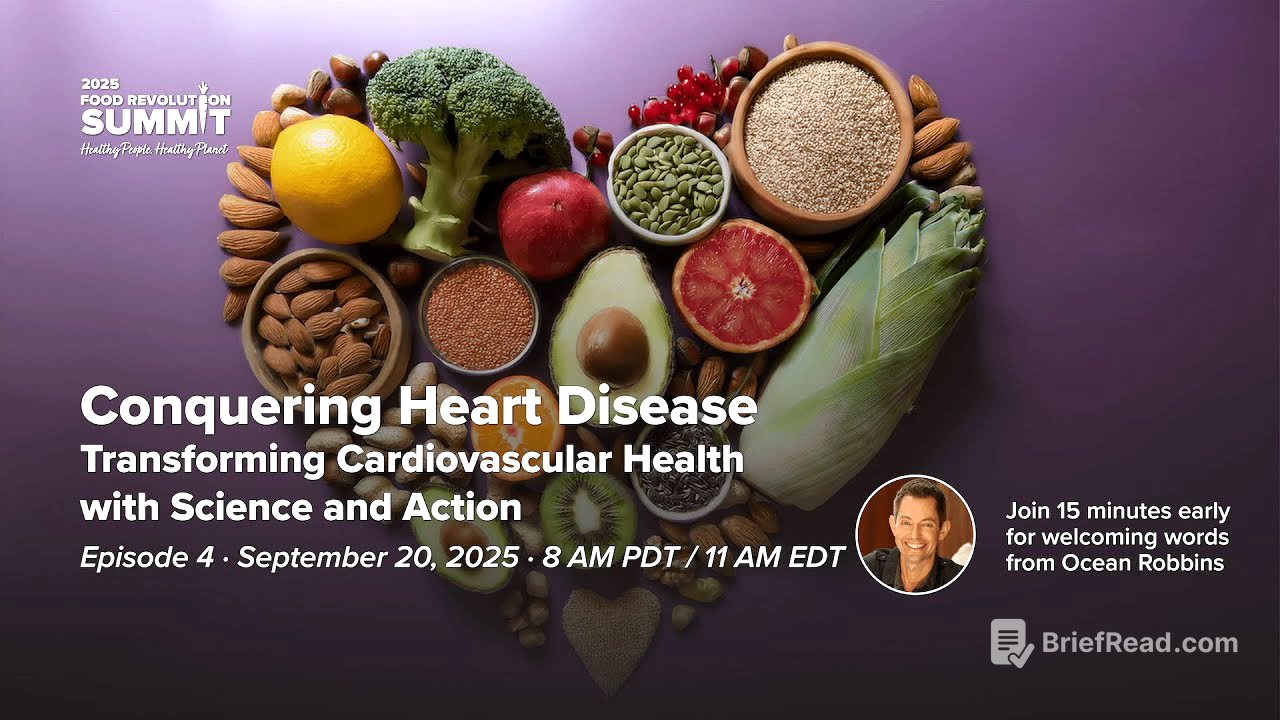TLDR;
This YouTube video is a broadcast of episode 4 of the Food Revolution Summit docuseries, focusing on conquering heart disease and transforming cardiovascular health through science and action. It emphasizes the preventability and reversibility of heart disease through diet, lifestyle, and early intervention. The episode highlights the importance of vegetables, fiber-rich foods, antioxidants, sleep, stress management, and emotional connection in maintaining cardiovascular health.
- Heart disease is preventable and reversible in many cases.
- Diet and lifestyle are primary drivers of cardiovascular health.
- Key factors include eating fruits and vegetables, not smoking, fitness, and adequate sleep.
Introduction to Episode 4: Conquering Heart Disease [0:31]
Ocean Robbins introduces episode 4 of the Food Revolution Summit docuseries, which focuses on conquering heart disease and transforming cardiovascular health. The episode explores how to protect the heart through science and everyday choices, including the benefits of certain vegetables, fiber-rich foods, and antioxidants. It also addresses the significant roles of sleep, stress, and emotional connection in cardiovascular health, emphasizing that heart disease is often preventable and even reversible.
Community Engagement and Questions [1:53]
Ocean Robbins engages with the audience by reading comments and answering questions. Jody from Pittsburgh shares her success in lowering her A1C level and reducing insulin usage through a plant-based diet. Dorothy asks about the best form of water to drink, considering microplastics in spring water. Ocean recommends using a metal quart jug and a home water filter to avoid plastic contamination. Richard inquires about the impact of proton pump inhibitors (PPIs) on nutrient absorption. Ocean explains that long-term PPI use can reduce the absorption of vitamin B12, calcium, and iron, and suggests monitoring nutrient levels and consuming fiber-rich and fermented plant foods to support gut health.
Finding Community and Addressing Dietary Concerns [6:54]
Laura seeks advice on finding a supportive community with shared food values, especially in a non-supportive family environment and in Nebraska, which lacks vegan options. Ocean suggests looking for natural food stores and virtual communities like Whole Life Club. Jackie asks about obtaining good bacteria without dairy products. Ocean recommends plant-based fermented foods like sauerkraut, kimchi, miso, tempeh, and plant-based yogurts. Jay inquires about managing oxalates with oxalate kidney stones. Ocean advises staying hydrated, pairing high-oxalate foods with calcium-rich foods, being mindful of vitamin C supplementation, and supporting gut microbiome health.
The Food Revolution and Cardiovascular Disease [15:18]
The Food Revolution is presented as an opportunity to improve life through better food choices, emphasizing its importance for human health and the planet. Cardiovascular disease is highlighted as the leading cause of death worldwide, with 18 million lives lost annually. It's noted that up to 80% of heart disease cases are preventable and reversible through diet, lifestyle, and early intervention.
Diet and Lifestyle as Primary Drivers [17:21]
Cardiovascular disease, including heart disease and stroke, is primarily driven by diet and lifestyle, particularly atherosclerosis. Traditional, plant-based diets in populations like the Papua New Guinea Highlanders and native South American tribes show minimal premature heart disease. In the U.S., African-Americans have the highest rates of heart disease and hypertension, leading to significant healthcare costs.
Dr. Dean Ornish's Groundbreaking Research [20:32]
Dr. Dean Ornish's research demonstrated that heart disease could be prevented and reversed through lifestyle changes, including a whole food plant-based diet, mindful meditation, and exercise. His 1998 study showed an 8% reduction in blockage over five years in the treatment group, compared to a 30% increase in the control group. There was also a 60% decrease in cardiovascular event rates in the treatment group. Dr. Ornish also worked with Bill Clinton to promote healthier eating.
Dr. Caldwell Esselstyn's Research on Plant-Based Diets [26:06]
Dr. Caldwell Esselstyn's research showed that a no-oil, whole food plant-based diet, combined with physical activity, resulted in a 0.9% cardiovascular event rate in the compliant group, compared to a 60% rate in the non-compliant group. This highlights the significant prevention of cardiovascular events through a healthy diet, which restores endothelial function by stimulating nitric oxide and lowering blood pressure, blood sugars, and cholesterol.
Foods That Devastate Endothelial Cells [29:18]
Dr. Esselstyn identifies foods that harm endothelial cells, including all oils (olive, corn, soybean, etc.), meat, fish, chicken, dairy (milk, cream, butter, cheese, ice cream, yogurt), and excessive amounts of maple syrup, molasses, and honey. Fructose injures endothelial cells.
The Role of Genetics: The Twin Study [30:17]
Dr. Christopher Gardner's study on identical twins examined the impact of vegan and omnivore diets on cardiovascular health. The vegan group experienced a drop in LDL cholesterol, weight loss, and lower fasting insulin levels. Additionally, the vegans showed better telomere length and epigenetic clock results, indicating they got younger in just eight weeks.
Underlying Biological Mechanisms and Lifestyle Factors [34:04]
The same lifestyle changes have a powerful impact on various diseases because they share underlying biological mechanisms such as chronic inflammation, oxidative stress, changes in the microbiome, telomeres, and gene expression. Key lifestyle factors include eating well, moving more, stressing less, and loving more. A European study found that eating more than five servings of fruits and vegetables, not smoking, getting 30 minutes of daily walking, and sleeping 7-8 hours a night led to an 85% reduction in heart attacks.
The Importance of Fruits, Vegetables, and Antioxidants [37:00]
While the U.S. government recommends at least 2.5 servings of vegetables and 2 servings of fruit per day, newer research suggests that increasing to 10 or more servings can provide even greater benefits. Fruits and vegetables mitigate the effects of oxidative stress, which is caused by factors like smoking and air pollution. Antioxidants, found in colorful fruits and vegetables, clean up oxidative stress in the body.
Dietary Patterns and Key Foods for Heart Health [40:58]
A whole foods plant-based diet is recommended for reversing unhealthy conditions. This involves pulling back from processed foods and reducing the intake of meat, dairy, and refined sugars. Key foods include greens (for dietary nitrates), beans (for magnesium and zinc), berries (for phytonutrients), seeds, and the allium family (onions and garlic).
The Role of Nitrates and Nitric Oxide [43:35]
Nitrates are converted into nitric oxide, which is essential for healthy blood vessels, blood pressure, lung and brain capacity, and sexual function. Nitric oxide comes from healthy blood vessels and the conversion of dietary nitrates in leafy greens by bacteria on the tongue. Foods like beets and beet greens are loaded with nitrates and can lower blood pressure.
The Food Matrix and the Benefits of Whole Plant Foods [46:54]
The benefits of plant-based nitrates come from the food matrix, which includes fiber and micronutrients. Animal-based sources of nitrates lack these benefits and can have negative aspects. Whole plant foods allow the body to become more biochemically and physiologically balanced, enhancing the cardiovascular system and other bodily functions.
Fasting and Its Impact on Heart Health [50:32]
Fasting, defined as the complete absence of all substances except water in an environment of rest, has several benefits, including weight loss, preferential mobilization of fat, and the selective elimination of sodium. It also promotes detoxification and healing. Autophagy, a process of rejuvenating and regenerating cells, is triggered after three days of low or no calorie intake.
Intermittent Fasting and Time-Restricted Eating [54:07]
There is controversy about intermittent fasting, with some studies suggesting that skipping breakfast increases the risk of heart attack. Three meals a day, structured with a larger breakfast and smaller dinner, are advised. A recent study presented at an American Heart Association meeting suggested that intermittent fasting was associated with a higher mortality rate, but this study had limitations.
Understanding Fats and Their Impact on Cardiovascular Health [59:18]
Trans fats are the worst fats for cardiovascular health and are found in heavily processed foods. Saturated fats, often found in animal products, are also major drivers of cardiovascular disease. Monounsaturated and polyunsaturated fats are better, and it's best to ingest fats in whole food form, such as chia seeds, flax seeds, and olives.
Olive Oil: A Closer Look [1:02:54]
Olive oil, celebrated in the Mediterranean diet, is rich in monounsaturated fats and antioxidants. However, Dr. Monica Agarwal's study showed that while a plant-based diet is beneficial, adding a high amount of olive oil (four tablespoons per day) did not enhance LDL reduction. It's better to use olive oil to enhance culinary life rather than for its health benefits.
Omega-3 Fatty Acids: Essential for Health [1:08:17]
Omega-3 fatty acids are essential and must be consumed through diet. They are beneficial for brain, skin, and cardiovascular health. Dr. Khan notes that many patients are low in omega-3 and recommends ground flax seed, walnuts, and algae-based supplements. It's important to get both short-chain (ALA) and long-chain (EPA and DHA) omega-3 fatty acids.
The Dangers of Excess Sodium [1:12:34]
Excess sodium leads to passive overeating by stimulating dopamine production and fooling satiety mechanisms. The American Heart Association recommends consuming less than 2,300 mg of sodium per day. Reducing sodium consumption by 30% could save 40 million lives. The primary sources of excess sodium are ultra-processed packaged foods and processed meats.
TMAO: An Inflammatory Biomarker [1:15:40]
Trimethylamine N-oxide (TMAO) is an inflammatory biomarker associated with heart disease. It is produced when gut bacteria process carnitine, found in meat. A plant-based diet shifts the gut flora, reducing TMAO production.
The Importance of Exercise [1:18:33]
Exercise is crucial for heart health. It leads to better outcomes than stent placement. Physical fitness is more predictive of longevity than heart function. Recommendations include 150-300 minutes of moderate exercise and 150 minutes of vigorous activity per week, combined with resistance training.
Managing Stress for Cardiovascular Health [1:21:59]
Chronic stress is linked to various disease states, including vascular health. Severe emotional stress can lead to broken heart syndrome. Stress management techniques include meditation, yoga, forest bathing, watching the sunrise, prayer, and other activities that promote ease.
The Impact of Love and Connection [1:24:15]
Love, connection, and meaningful relationships have profound effects on heart health. Loneliness and social isolation are significant risk factors for heart disease. Companionship, intimacy, and community are healing. Pets provide unconditional love and can improve lifespan.
Extending Compassion to All Animals [1:31:37]
The video raises the question of whether extending compassion to all animals, not just pets, could make us happier and healthier. It emphasizes the importance of knowing where our food comes from and moving away from cruelty in animal farming.
Dr. Baxter Montgomery's Personal Transformation [1:34:03]
Dr. Baxter Montgomery, a cardiologist, transformed his practice after experiencing significant health improvements through a raw vegan diet. He now helps his patients heal their hearts with diet and lifestyle changes.
Food Revolution Network's Mission [1:39:00]
The Food Revolution Network's mission is to promote healthy, ethical, and sustainable food for all. They advocate for nutrition education in schools and medical training, banning routine antibiotic use in factory farms, and ensuring access to healthy food for all communities.
Community Stories and Questions [1:40:06]
The video shares stories from viewers who have experienced positive changes through plant-based diets. Siri from Alberta, Canada, has been on a plant-based diet for six years. Renee shares how a plant-based diet helped her husband reverse diabetes, high cholesterol, and high blood pressure, and improved her autoimmune condition. Jill asks about the benefits of a plant-based diet for her brother with Louisbody dementia. Jennifer from Fort Worth, Texas, lost 60 pounds and reversed her diabetes issues.
Empowerment Package and Whole Life Club [1:46:43]
The Empowerment Package provides access to summit materials, and Whole Life Club offers ongoing support and a community for those on a plant-based journey. Lori appreciates the ability to revisit the information and the community support.
Addressing Specific Health Concerns and Dietary Questions [1:48:07]
Deborah asks about reversing atrial fibrillation (AFib). Ocean explains that while sometimes reversible, it's often about managing and minimizing it through medical procedures and lifestyle changes. Caroline questions eliminating meat for B12. Ocean explains that animal products are not an ideal source due to associated health risks and that B12 supplementation is a safer and more reliable option.
Vincent Cavino's Story: From Heart Attack Survivor to Plant-Based Coach [1:53:12]
Vincent Cavino shares his story of surviving a widowmaker heart attack and transforming his life through a whole food plant-based lifestyle. He became a plant-based coach through the Food Revolution Network to help others reverse heart disease symptoms.
Addressing Dietary Questions and Concerns [1:59:20]
Brooke asks about the types of greens to eat. Ocean clarifies that all types of greens are beneficial, including Roma and iceberg lettuce, though some are more nutrient-dense than others. Patricia shares her positive experience with the "Powered by Plants" cookbook. Annette asks about the effects of toasting nuts on omega-3s. Ocean explains that while some nutrients can be impacted by high heat, nuts are still beneficial, and roasting at lower temperatures is preferable. Karen asks about the healthiness of eating wild-caught salmon or cod four times a week. Ocean advises considering the potential for mercury and microplastic exposure and suggests algae-based omega-3 supplements as an alternative.
Expert Interviews and Upcoming Episode [2:08:10]
The video highlights expert interviews with Dr. Joel Khan, Dr. Monica Agarwal, and Dr. Columbus Batist. The next episode will focus on cancer, exploring how daily choices can protect health and lower cancer risk.









